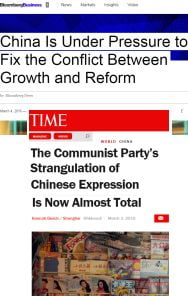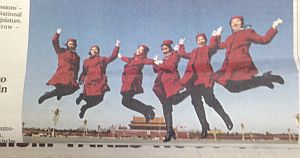Unable to dismiss and ignore the ‘two meetings’ in Beijing – but incapable of finding any substance in it – the world’s media cover issues that China’s leaders should in theory be addressing in the coming couple of weeks.
The obvious is the ongoing conundrum: how to develop a higher-productivity economy while maintaining a control-obsessed one-party state. Bloomberg’s report today gives the  standard analysis of the familiar problems, such as excess debt and capacity, and the official reluctance to shut down loss-making state industries. According to this business-story perspective, reluctance to reform is due to a lack of Thatcherite will. China’s leaders would like to kill off the SOEs and have a more competitive, higher-value economy with more services/consumption/etc, but their fear of social unrest is too great – and wouldn’t we feel the same way in their place?
standard analysis of the familiar problems, such as excess debt and capacity, and the official reluctance to shut down loss-making state industries. According to this business-story perspective, reluctance to reform is due to a lack of Thatcherite will. China’s leaders would like to kill off the SOEs and have a more competitive, higher-value economy with more services/consumption/etc, but their fear of social unrest is too great – and wouldn’t we feel the same way in their place?
The media commentators’ assumption is that the need for serious reform is self-evident and beyond dispute: slower growth means fewer jobs and slower rises in incomes, end of story. Some of these observers dig deeper and put it in the context of maintaining leadership legitimacy, but even here they see reform as compelling and a necessity.
But it’s not a business, economic-restructuring or even social-stability story: it’s purely about how the Communist Party keeps itself in power. The Communist Party wants reform if it helps the Party stay in power; if reform will reduce the Party’s ability to keep its grip, it doesn’t want it. Simple as that.
The reforms needed to move China up the productivity ladder are not conducive to maintaining – or more correctly assuring in paranoid minds – party-state monopoly of power and control. They include:
- Letting markets allocate capital in order to increase returns on investment. Not do-able because the regime needs to divert the people’s savings to favoured sectors to support strategic or family/friends’ interests.
- Freeing up other markets, like equities or – more important – foreign exchange. We saw last year that China’s leaders are not psychologically capable of abstaining from managing markets. They can’t let Hong Kong choose its own mayor; why would they let global markets/’foreign forces’ decide the exchange rate of the Yuan and the consequent fate of the nation?
- Allowing other forms of competition, such as for market share. The regime needs to protect favoured players. Whether they are public-sector (like energy and financial giants) or apparently private (Alibaba, Tencent), they are all part of the strategic/kleptocrat structure propping up the Party.
- Accepting a rules-based system to protect intellectual property, enforce contracts and maintain a level playing field. This is not compatible in an environment in which intimidation, cheating and stealing are acceptable regulatory or commercial practices for insiders (eg, the shakedowns of foreign auto, pharma, tech brands). Ultimately, this implies rule of law, which implies a loss of Party control – which means ‘forget it’.
- Encouraging and rewarding innovation and experimentation. That means developing an official culture that doesn’t punish failure and permits debate. That means freeing up academia and the media. (A glimmer of hope here comes from Time, which suggests that China’s current clampdown on the media can’t go much further, but as Jiang Zemin might have said – naïve!)
This list could go on. The point is, every time you see a guy in a suit on CNN saying the Yuan will be freely convertible in five years, he is saying the CCP is cool about losing power. Sounds unlikely. Faced with the alternative of letting go, they will chance economic stagnation and tighten controls, every time. Of course, it can’t last forever.
Meanwhile, we have some exciting news out of the ‘two meetings’ in Beijing. Yu Zhengshen, the chairman of the Chinese People’s Political Consultative Blah-Blah urges delegates to…
“resist and oppose anything” that might “violate, undermine and weaken political foundation for consensus”.
And if that’s not inspiring enough, I declare the weekend open with his ‘hip and groovy with the kids’ thing – and we mean here the Hong Kong kids…
You never thought a phrase like ‘We will participate in work related to young people’ could sound so creepy and menacing.




Since we’re on the subject of “working with young people”, whatever happened to that creepy Boy-Scouts-meets-Mao yoof organization from a couple of years ago?
There will be no need for Hemlock to comment further on economic developments in the Middle Kingdom so long as the CCP remains in power. This blog post says it all.
Rules-based system…do you mean “law”? China has regulations, not laws. There’s nothing funnier than a seminar about Chinese law. City U does them I think. And you don’t need to heckle. People just look at each other. Without laws, any system is necessarily corrupt. So China is beaten before it starts. Great.
“China’s current clampdown on the media can’t go much further”. Well, they could pick off overseas media one by one, plus universities, blogs, writers, software companies, starting of course with Chinese-medium ones. Oh… they’ve been doing that already.
Fine piece, Hemlock, but I would have appreciated a soupcon more precision in your prognosis that “‘it’ can’t last forever”. It would be helpful if we could know what sort of crisis is coming, and how we’ll know it’s started.
Given the recent experiences of Lee Bo et al, the phrase “mainland study trips provided for young Hong Kongers” is far more creepy and menacing than “We will participate in work related to young people”.
One is taught not to pitch one’s tent in a dry stream bed; nor, moreover, build sandcastles in Typhoon Alley; nor, repress the masses and simultaneously control the current account, the capital account and the exchange rate.
Fantastic article – so many gems. Hemmers, I feel you are writing like an in-form batsman at the moment seeing the ball like a watermelon – smashing it all round the park.
My favourite – “The Communist Party wants reform if it helps the Party stay in power; if reform will reduce the Party’s ability to keep its grip, it doesn’t want it. Simple as that.
Monkey the Unborn, March 1st: “I do believe QJ is due his own ode at some point.”
Who is this that writes? Pause a moment,
Reader. Ponder the sagacious comment
Of everybody’s favourite opponent.
Is he a hack who, craving fifty cents,
Springs to China’s valiant defence?
Is he a bitter western renegade,
Moral, revolutionary, unpaid?
Is he a mischief-maker, loving jokes,
Laughing at the anger he provokes?
Is he a soul undead, a restless wraith,
Enlivened by his patriotic faith?
Or is he, lurking in a virtual hole,
A vile and vicious, dark and devious troll?
No matter. Now the hero comes,
Strike the gong and beat the drums!
Bang and clatter
The Great Firecracker!
Hail and harken
The Blazing Beacon!
Bringing truth, bringing light
To this wayward website!
If you combined Qian Jin and Knownot I suspect you’d get Pierce Lam AKA pslhk. Now there’s an (ass)hole greater than its parts.
“resist and oppose anything” that might “violate, undermine and weaken political foundation for consensus”.
One is reminded of one of Thatcher’s better quotes “Consensus is the absence of leadership”.
The best: “We are a grandmother”.
@Tiu Fu Fong – true leadership is not bashing everyone over the head until they agree to agree with you, Thatcher/Trump/CCP style. It is setting out boldly in the right direction, AND persuading everyone else (or most of them, anyway) to follow you.
One could hope that one day an elevator to their secret vault of
kickbacksloot breaks down and no one notices that Lufsig, Eddie Ng, and the lot have gone missing. At least until everyone starts to wonder why there’s been no recent crisis in HK.http://www.latimes.com/world/asia/la-fg-china-elevator-trapped-starve-death-20160305-story.html